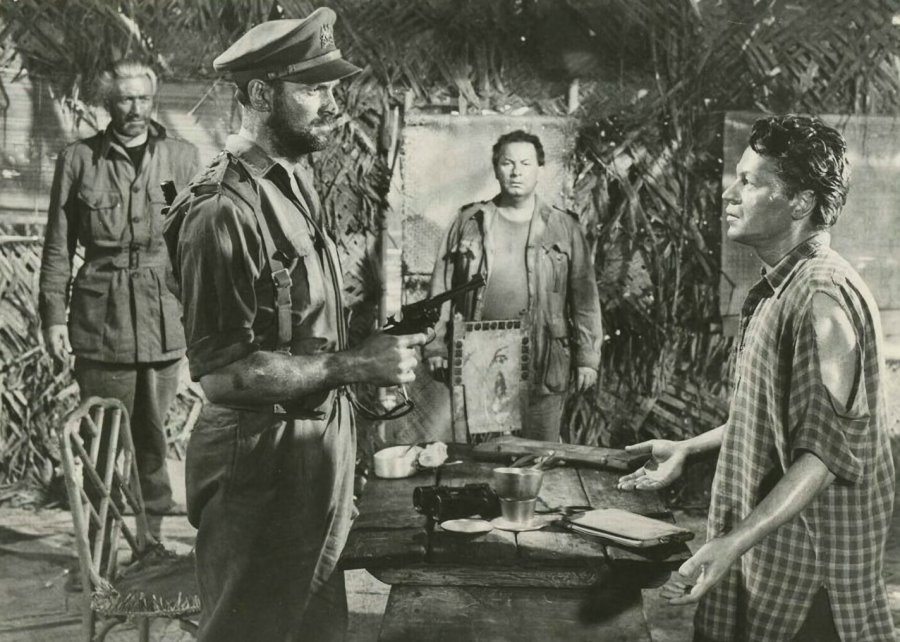Theme of the Month: War
April 29, 2020
Theme of the Month is an article series designed to investigate examples of film, television, and writing that fall under a certain category. This month’s (delayed) theme is “War.”
“Yesterday’s Enemy”
“Sixpence for a poppy and two minutes’ silence once a year. Yesterday’s enemy laying a wreath to honor the dead his country killed!”
This woefully neglected anti-war effort was produced by British horror legends Hammer Film Productions, and is seen as a response to another film of theirs, “The Camp on Blood Island,” released a year prior in 1958. The critical reception of “Blood Island” was vicious, but not entirely unfounded: its portrayal of Japanese soldiers (played by non-Asian actors, no less!) was ignorant at best and prejudiced at worst. They were shown as sadistic bullies, regularly terrorizing British POWs, and unafraid to commit countless war crimes.
In contrast to the neverending violence of “Blood Island,” “Yesterday’s Enemy” takes a more thoughtful approach to the brutality of war. Following the willful Captain Langford and his brigade as they take, occupy, and defend a village deep in the Burmese jungle during WWII. When an informer for the Japanese is caught, Langford decides to get information out of him by any means necessary; the painfully ironic final act puts Langford on the other side of the situation.
“Yesterday’s Enemy” is much different than any other war movie I’ve seen. Even in films that show the uglier side of war, the main character usually has a moment to act like a true hero. To some extent, there are heroic actions in “Yesterday’s Enemy,” but screenwriter Peter R. Newman shows that they are done in vain.
Newman, working off of his 1958 BBC teleplay, crafts a meaningful story with plenty of memorable dialogue. The film matches this great screenplay with an exceptional cast. You have the compassionate Padre (Guy Rolfe); the stout but serious war correspondent Max (Leo McKern); Major Yamazaki (Philip Ahn), an intelligent Japanese officer; and, of course, Captain Langford (Stanley Baker).
“Yesterday’s Enemy” would go on to receive four British Academy of Film and Television Arts nominations, but has not remained in the public eye, which is a shame. It may not be as traditionally “exciting” as the classic war epics, but its moral questions are just as powerful.
“If only I could believe this will make some difference.”
“Ivan’s Childhood”
This film tells the story of Ivan, an orphan who works as a scout for the Russian army during WWII, by switching between the horrific present and Ivan’s peaceful life before the war began.
First-time director Andrei Tarkovsky employs a number of symbols here, the most obvious one being trees. They’re all over the film, from the playful opening scene all the way to the sorrowful final shot. A tree is even the subject of the poem “Ivan’s Willow,” written by Tarkovsky’s father, which is said to be a source of inspiration for the film:
“Before the war Ivan would walk down the stream
Where there grew a willow, no one knew whose.
No one knew why it loomed over the stream;
No one knew this was Ivan’s willow tree.
In his canopied raincoat, killed in combat,
Ivan came back to his willow’s shade.
Ivan’s willow,
Ivan’s willow,
Like a white boat, it floats downstream.”
Shot in stark black and white, “Ivan’s Childhood” is a visually impressive achievement and foreshadows Tarkovsky’s successes to come. But above all, it is a moving film that focuses on the most undeserving victims of war.
–
“Apocalypse Now”
I watched “Apocalypse Now” only one night after seeing “Seven Samurai,” and let me tell you, it was one hell of a weekend. Both are lengthy films that involve you in their storylines (“Seven Samurai” with its characters and epic plot, “Apocalypse Now” with its nightmarish world), though their messages are worlds apart.
Damaged Vietnam War veteran Captain Benjamin L. Willard is sent to assassinate Colonel Walter E. Kurtz, a celebrated officer who has gone rogue in the Cambodian jungle. As Willard and his crew venture deeper into the jungle, they draw ever closer to the heart of darkness.
The production of “Apocalypse Now” is infamous: actor Marlon Brando turned up overweight and unprepared. A planned four months of shooting lasted over a year. Director Francis Ford Coppola threatened to commit suicide… the list goes on.
When they came out of the jungle, though they had one of the greatest war films ever made, its questions on the human condition extremely affecting.
There’s an interpretation that says Colonel Kurtz was the only sane person in an insane world. I reject this belief, since it conveniently forgets the severed heads Kurtz keeps as home décor. Another reading is that Kurtz is a cut-and-dry loon, which doesn’t do his character’s purpose justice. As Robert Duvall’s Colonel Kilgore (“I love the smell of Napalm in the morning”) shows, the U.S. doesn’t care about officers with questionable motives. They want Kurtz dead because he is acting without permission, even if those actions are similar to Kilgore’s, due to his uglier, less “dignified” methods.
The very fact I’m discussing this proves its thought-provoking nature to me, and hopefully to you as well. “Apocalypse Now” is a movie that cuts deep, and like the two films above, is sure to stir discussion after the credits roll.



